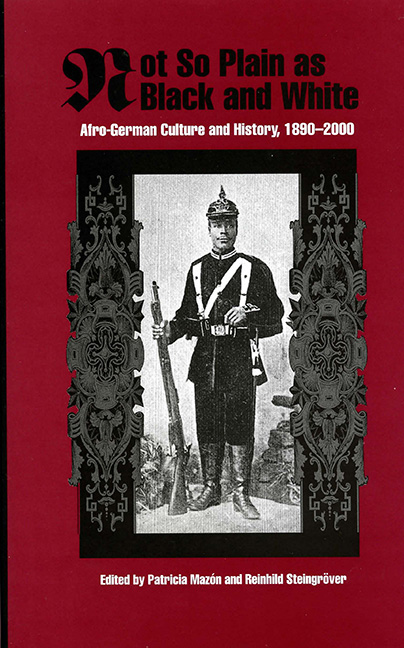Book contents
- Frontmatter
- Contents
- Foreword
- Introduction
- Part I Afro-Germans in Historical Perspective
- Part II Cultural Representations and Self-Representations of Afro-Germans
- 4 Louis Brody and the Black Presence in German Film Before 1945
- 5 Narrating “Race” in 1950s’ West Germany: The Phenomenon of the Toxi Films
- 6 Will Everything Be Fine? Anti-Racist Practice in Recent German Cinema
- 7 Writing Diasporic Identity: Afro-German Literature since 1985
- 8 The Souls of Black Volk: Contradiction? Oxymoron?
- Selected Bibliography
- Notes on Contributors
- Name Index
5 - Narrating “Race” in 1950s’ West Germany: The Phenomenon of the Toxi Films
from Part II - Cultural Representations and Self-Representations of Afro-Germans
Published online by Cambridge University Press: 11 May 2017
- Frontmatter
- Contents
- Foreword
- Introduction
- Part I Afro-Germans in Historical Perspective
- Part II Cultural Representations and Self-Representations of Afro-Germans
- 4 Louis Brody and the Black Presence in German Film Before 1945
- 5 Narrating “Race” in 1950s’ West Germany: The Phenomenon of the Toxi Films
- 6 Will Everything Be Fine? Anti-Racist Practice in Recent German Cinema
- 7 Writing Diasporic Identity: Afro-German Literature since 1985
- 8 The Souls of Black Volk: Contradiction? Oxymoron?
- Selected Bibliography
- Notes on Contributors
- Name Index
Summary
In the spring of 1952, West German moviegoers flocked to the feature film Toxi (R. A. Stemmle), the fictional story of a black German girl, making it one of the top ten box-office hits of the year. The film was notable on a number of counts. First, it was the first feature-length film to explore the subject of black “occupation children” born to white German women and fathered by occupation soldiers of color in postwar Germany. Released to coincide with the start of the school year for the oldest of the postwar black German children, the film had the explicit purpose of cultivating, in addition to profit, “social understanding” for the children as they made the difficult transition from the privacy of home to the public arena of school and classroom. Second, it was one of the few postwar films—and to my knowledge the only one in the early 1950s—to explicitly thematize the “race problem” (Rassenproblem) in Germany and call it by its name. Finally, the film initiated the popularity and brief acting career of Elfie Fiegert, who played the title character of Toxiand later reprised the role of black occupation child (this time as Moni) in the 1955 West German film Der dunkle Stern (The Dark Star, Hermann Kugelstadt). I argue in this essay that the thematic treatment of Toxi yields insight into the precise ways that “race” was renarrativized after 1945 as a social category and national marker. Critical attention to Elfie Fiegert's brief career and the so-called sequel to Toxi provide a context in which to assess the contours and evolution of racial ideology in Adenauer's Germany.
By the time of the film's release in early 1952, black German children numbered over three thousand in West Germany, and despite their small numbers had already become its premiere minority group, to judge from the continual coverage of the children in the print media. In scores of articles in newspapers, popular magazines, and scholarly journals, the children were described as posing a significant social “problem” for post-war Germany and were either pitied or pilloried due to the racial and national heritage of their fathers and the perceived provocative and censorious behavior of their mothers, who fraternized with the nonwhite soldiers of enemy armies.
- Type
- Chapter
- Information
- Not So Plain as Black and WhiteAfro-German Culture and History, 1890–2000, pp. 136 - 160Publisher: Boydell & BrewerPrint publication year: 2005



